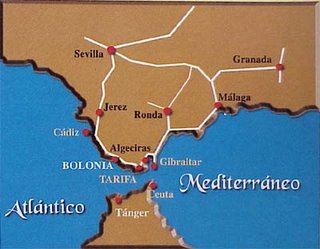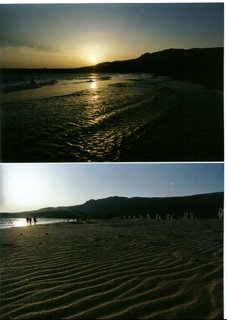Thursday, August 31, 2006
Friday, August 25, 2006
I am what I feel
 "I am what I feel", Jimi Hendrix once said, "I play as I feel and I act as I feel. I can't express myself in any conversation. I can't explain myself like this or like that - But when I'm up on stage, it's all the world. It's my whole life."
"I am what I feel", Jimi Hendrix once said, "I play as I feel and I act as I feel. I can't express myself in any conversation. I can't explain myself like this or like that - But when I'm up on stage, it's all the world. It's my whole life."
- Thirty five years after his death Hendrix is as much a legend as he was in his own lifetime and memories of his extraordinary performances on stage remain strong. A left-handed player, Hendrix could coax all kinds of sounds from his electric guitar and enjoyed demonstrating his virtuoso skills with such tricks as playing his instrument behind his back or playing it with his teeth.
- James Marshall Hendrix was born in Seattle in November 1942 and began his career as a back-up musician to such stars as Little Richard and the Isley Brothers. In 1966 he was playing in a New York club when he was heard by the British bass guitarist and would-be manager Chas Chandler. Chandler persuaded him to visit London and helped him to form a group known as the Jimi Hendrix Experience.
- The following year was the group's greatest year with three hits - 'Purple Haze', 'Hey Joe' and 'The Wind Cries Mary' - in the first six months and a sensational appearance at the Monterey Pop Festival in the summer.
- The final years of Hendrix's life were complicated ones. The line-up of his backing group changed frequently as players came and went. He seemed to lose musical direction and struggled to complete a new album. Legal disputes with management and record companies hung over his head. However, he was still at the height of fame and notoriety in September 1970 when he died of an accidental drugs overdose at the house in Brook Street which now bears a blue plaque in his honour. On the house next door there is also a plaque to a musician but a very different one - George Frederick Handel, the composer of the Water Music.
George Orwell
 Eric Blair was born in India, where his father was a civil servant, in 1903 and brought to England by his mother when he was a year old.
Educated at Eton, to which he had won a scholarship, he was unable to go on to university and instead joined the Indian Imperial Police in Burma, serving as an officer for several years before resigning and travelling back to England.
He returned from Burma, disgusted by colonialism and eventually began a precarious career as a freelance writer, taking the pen name George Orwell. George seemed to him an unpretentious English name and the River Orwell ran through a part of the Suffolk countryside which he particularly loved. Books in the thirties such as Down and Out in Paris and London, The Road to Wigan Pier and Homage to Catalonia gave him a reputation as a writer of bluntly honest prose but did not provide him with an adequate income. He took other jobs, including working at a Hampstead bookshop, and wrote quantities of journalism.
During the war he worked for The Observer and at the BBC, which he memorably described as having an atmosphere 'something halfway between a girls' school and a lunatic asylum.' After the war his fortune was made by his two most famous novels, Animal Farm and 1984, but Orwell was already a sick man and he died of tuberculosis in 1950, the year after the publication of 1984. He was only forty-six years old. Orwell was an unashamedly political writer and Cyril Connolly, who had been at school with him, once wrote that, 'He would not blow his nose without moralising on conditions in the handkerchief industry.' The blue plaque to George Orwell is on a house in Lawford Road, Kentish Town where he had a flat in the 1930s.
Eric Blair was born in India, where his father was a civil servant, in 1903 and brought to England by his mother when he was a year old.
Educated at Eton, to which he had won a scholarship, he was unable to go on to university and instead joined the Indian Imperial Police in Burma, serving as an officer for several years before resigning and travelling back to England.
He returned from Burma, disgusted by colonialism and eventually began a precarious career as a freelance writer, taking the pen name George Orwell. George seemed to him an unpretentious English name and the River Orwell ran through a part of the Suffolk countryside which he particularly loved. Books in the thirties such as Down and Out in Paris and London, The Road to Wigan Pier and Homage to Catalonia gave him a reputation as a writer of bluntly honest prose but did not provide him with an adequate income. He took other jobs, including working at a Hampstead bookshop, and wrote quantities of journalism.
During the war he worked for The Observer and at the BBC, which he memorably described as having an atmosphere 'something halfway between a girls' school and a lunatic asylum.' After the war his fortune was made by his two most famous novels, Animal Farm and 1984, but Orwell was already a sick man and he died of tuberculosis in 1950, the year after the publication of 1984. He was only forty-six years old. Orwell was an unashamedly political writer and Cyril Connolly, who had been at school with him, once wrote that, 'He would not blow his nose without moralising on conditions in the handkerchief industry.' The blue plaque to George Orwell is on a house in Lawford Road, Kentish Town where he had a flat in the 1930s.
Comprehension quiz:
http://www.bbc.co.uk/worldservice/learningenglish/radio/specials/1758_blue_plaque/page2.shtml
Monday, August 21, 2006
Bats
 Two vampire bats wake up in the middle of the night, thirsty for blood.
Two vampire bats wake up in the middle of the night, thirsty for blood.
- One says, "Let's fly out of the cave and get some blood."
- "We're new here," says the second one. "It's dark out, and we don't know where to look. We'd better wait until the other bats go with us."
- The first bat replies, "Who needs them? I can find some blood somewhere." He flies out of the cave. When he returns, he is covered with blood.
- The second bat says excitedly, "Where did you get the blood?"
- The first bat takes his buddy to the mouth of the cave. Pointing into the night, he asks, "See that black building over there?" "Yes," the other bat answers. "Well," says the first bat, "I didn't."
Friday, August 18, 2006
Quotes of the day
 If you treat people right they will treat you right - ninety percent of the time.
Franklin D. Roosevelt
When you have given nothing, ask for nothing.
Albanian Proverb
A book is a version of the world. If you do not like it, ignore it; or offer your own version in return.
Salman Rushdie
If you treat people right they will treat you right - ninety percent of the time.
Franklin D. Roosevelt
When you have given nothing, ask for nothing.
Albanian Proverb
A book is a version of the world. If you do not like it, ignore it; or offer your own version in return.
Salman Rushdie
Monday, August 07, 2006
Bolonia (Cádiz)

 This large unspoilt beach is almost 4000m in length and it has golden sand. It is a windy beach with moderate waves and crystal clear blue water. The beach is relatively busy with only two small towns nearby, el Lentiscal and Bolonia.
A beautiful sand dune that stands over 30m in height and declared a natural monument by the environmental council is on the other side of the beach.
The archaeological roman site of Baelo Claudia is nearby. In 1917 archaeologists unearthed the ruins of a prosperous city in the area of Bolonia.
Some pictures of Tarifa, nearby Bolonia
http://www.andaluciadiary.com/photos/costa_de_la_luz/tarifa_001.html
Information about Tarifa
http://www.tarifaweb.com/
This large unspoilt beach is almost 4000m in length and it has golden sand. It is a windy beach with moderate waves and crystal clear blue water. The beach is relatively busy with only two small towns nearby, el Lentiscal and Bolonia.
A beautiful sand dune that stands over 30m in height and declared a natural monument by the environmental council is on the other side of the beach.
The archaeological roman site of Baelo Claudia is nearby. In 1917 archaeologists unearthed the ruins of a prosperous city in the area of Bolonia.
Some pictures of Tarifa, nearby Bolonia
http://www.andaluciadiary.com/photos/costa_de_la_luz/tarifa_001.html
Information about Tarifa
http://www.tarifaweb.com/



